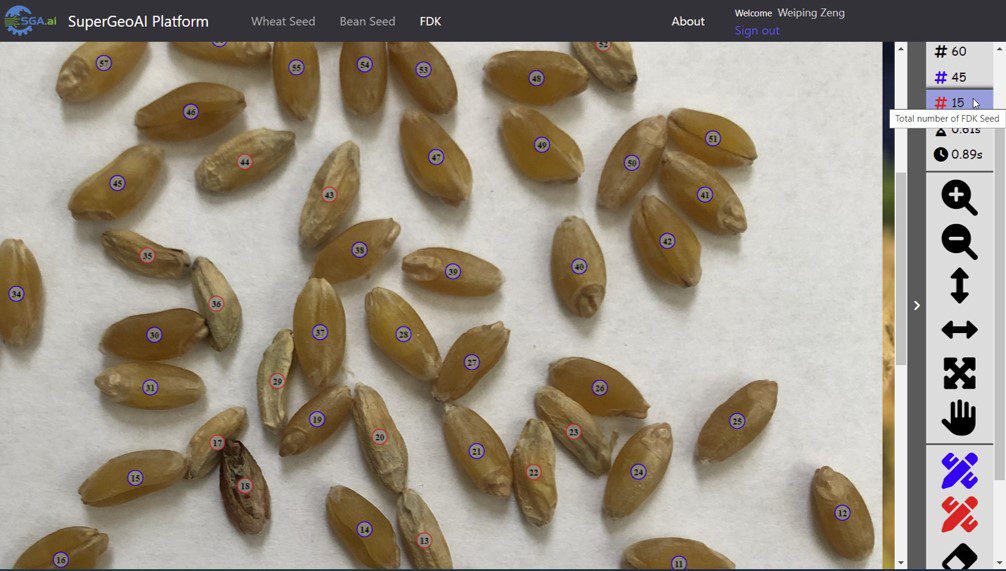
Weiping Zeng, the project lead for GeoAI Platform for Automating Manual Observation Associated with Wheat Production, grew up on a farm in China. He moved to Canada in 2002 to get his PhD from the University of Alberta. Following a three-year stint in Calgary working for a startup, he joined the faculty of the University of Saskatchewan. “The idea to found Super GeoAI Technology came from two places,” he explains. “First, as I am from a farming family, I have personal experience with just how labour-intensive agriculture can be. Second, I was heavily influenced by a conversation I had near Saskatoon with a farmer who was counting and evaluating wheat kernels manually. It occurred to me that this was a place where artificial intelligence could add real value. Producers work very hard for uncertain returns, and any technological solutions we can develop to increase productivity and decrease workload is worth exploring.”
The grain sector is a key Canadian economic driver, contributing over $20 billion annually from wheat export sales alone. Product quality is a critical component of the value chain, impacting everyone from producer to consumer. Evaluation is the responsibility of grain inspectors, who must manually identify, separate, and analyze kernels to determine a sample’s quality and grade. These subjective results can be unreliable and inaccurate, and may lead to conflict between the buyer and seller, damaging important commercial relationships. For many years, the industry has sought an affordable solution capable of delivering a quick and accurate end-use quality assessment based on representative samples.
“Our project team of agri-food companies and academic institutions is employing diverse technologies to develop a novel geospatial artificial intelligence (GeoAI) platform proof-of-concept that automates manual wheat-production observations,“ says Weiping. “We are leveraging geospatial, deep learning, machine vision, and high-performance computing technology to evaluate three representative primary objective characteristics and one subjective characteristic in Canada Western Red Spring Wheat kernels.“
Following the initial 15-month CAAIN investment period, R&D will continue, leading to eventual commercialization and product adoption. The goal is to create and market a scaled-up, all-in-one GeoAI-driven cloud platform that automates grain grading, reducing manual observation requirements, and increasing producer productivity, profitability, sustainability, and competitiveness.
This highly complex, multifaceted project seeks to solve a challenge that has plagued the agricultural sector for the past 100 years, namely, how to grade grain consistently and objectively to the satisfaction of both buyer and seller. CAAIN is pleased to be able to fund such important work, and Dr. Zeng and his team appreciate the support. “When we first responded to the 2021 Open Competition, we were looking to automate various agricultural tasks. The feedback we received from the reviewers helped us zero in on grain grading.” He smiles. “We are now developing a solution to a very specific global problem, and that’s very exciting. That initial guidance was more important than we realized at the time, as potential investors appreciated our clearly defined objective. Don’t get me wrong. The money has been very helpful, and we wouldn’t be anywhere near where we are now without it. But probably the greatest value we’ve received through our association with CAAIN is the network we’ve joined. For example, thanks to the doors this competition opened for us, we are collaborating with Olds College and the University of Saskatchewan. This kind of program will really advance AgTech in Canada.”
CAAIN Contribution
$372,370
Total Project Value
$1,198,103
Project Contact
Weiping Zeng
Super GeoAI Technology
wzeng@sga.ai